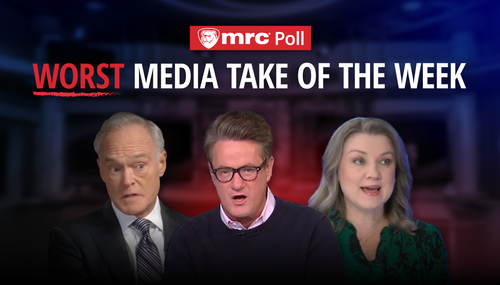During a live interview with former Defense Secretary Robert Gates on Monday's NBC Today, co-host Matt Lauer suggested that criticism of President Obama in Gates's new memoir was endangering American troops overseas: "As this criticism is leveled by you in the book of the commander-in-chief, the acting commander-in-chief, at a time when some 40,000 U.S. troops are in harm's way, do you think that by calling him into question at this stage it is either dangerous or dishonorable?"
After Gates rejected the notion, Lauer insisted: "But you don't think it undermines his credibility with the troops he is commander-in-chief of right now?" At the top of the show, Lauer teased the interview: "Robert Gates on his new memoir and his criticism of President Obama. Is it fair with U.S. troops still in harm's way?"
When excerpts of the book were released on January 8, Lauer proclaimed that Gates had "blindsided" the President with "blistering" criticism.
Back when disgruntled government officials were out with memoirs bashing President George W. Bush, NBC skipped any questions about their criticism being "dangerous" and instead urged them to be tougher on their former boss.
Here is a transcript of Lauer's questions to Gates during the January 13 exchange:
7:15AM ET
LAUER: Former Defense Secretary Robert Gates, who served both the Bush and Obama administrations, has sparked a firestorm with his new memoir. In it, he takes aim at everyone from the President to Congress and even former Secretary of State Hillary Clinton. The book is called Duty: Memoirs of a Secretary at War. Secretary Gates, good to see you as always.
ROBERT GATES: Thank you.
LAUER: You surprised by the reaction?
[ON-SCREEN HEADLINE: Robert Gates One-On-One; Opens Up About Book Blasting Obama Administration]
(...)
LAUER: You say taken out of context. You know, in reading the book, there are a lot of times where you level a very stark criticism at someone. And then a couple of sentences later, or maybe paragraphs later or pages later, you kind of ease back on and say something, "Well, actually, I kind of agreed with that person." But you're a veteran. You served for eight presidents, actually, you've been in Washington for a long time. You know that it's the grenade you throw, more than the pullback, that's gonna make the headlines. You had to know this would happen.
(...)
LAUER: You agree with those decisions after saying that you thought the President had lost his belief in the mission or his passion in the mission [in Afghanistan]. And by the way, it's not something you just say once in the book. By my count, you said it about eight times, using terms like you "expected more commitment to the cause," you "doubted his support for the mission," and you said that "he was skeptical, if not outright convinced that it would fail." So you made a pretty strong book – point in the book that he didn't believe in the mission.
(...)
LAUER: But as he started to, perhaps, believe in the success of that mission less, you're still signing deployment orders for people to go over there. As secretary of defense, did you have a bad feeling about that? Did you ever confront the President about his lack of passion for that mission at that time?
(...)LAUER: As this criticism is leveled by you in the book of the commander-in-chief, the acting commander-in-chief, at a time when some 40,000 U.S. troops are in harm's way, do you think that by calling him into question at this stage it is either dangerous or dishonorable?
(...)
LAUER: But you don't think it undermines his credibility with the troops he is commander-in-chief of right now?
GATES: No, I don't.
LAUER: Let me move on to another subject. And this is one that's gotten a lot of attention. You recount a conversation between Hillary Clinton and the President talking about George Bush's surge in Iraq, where you basically say that, "Hillary told the President that her opposition to the surge had been political because she was facing him in the Iowa primary and the President conceded vaguely that his opposition to the Iraq surge had also been political." That's a pretty strong statement. I think people have a right to know – not "conceded vaguely" – what exactly did the President say?
(...)
LAUER: But this revelation that perhaps her [Clinton's] opposition was purely political because of the Iowa primary. Do you think that will or should hurt her in her political ambitions down the road?
(...)
LAUER: Let me end on this. And this is something that got me. You talk about visiting cemeteries and the front lines and hospitals and seeing wounded soldiers. And you say you would wake up in the middle of the night, think of a wounded soldier you saw in a hospital, and you said in the book, quote, "In my imagination, I would put myself in his hospital room and I would hold him to my chest to comfort him. Silently in the night, I would weep for him." How did seeing the cost of war up close impact you, Mr. Secretary?
(...)
LAUER: Former Secretary of Defense Robert Gates. Mr. Secretary, feel better.
GATES: Thanks a lot, Matt. Appreciate it.
LAUER: Appreciate it. Tell everybody the book is called Duty.




